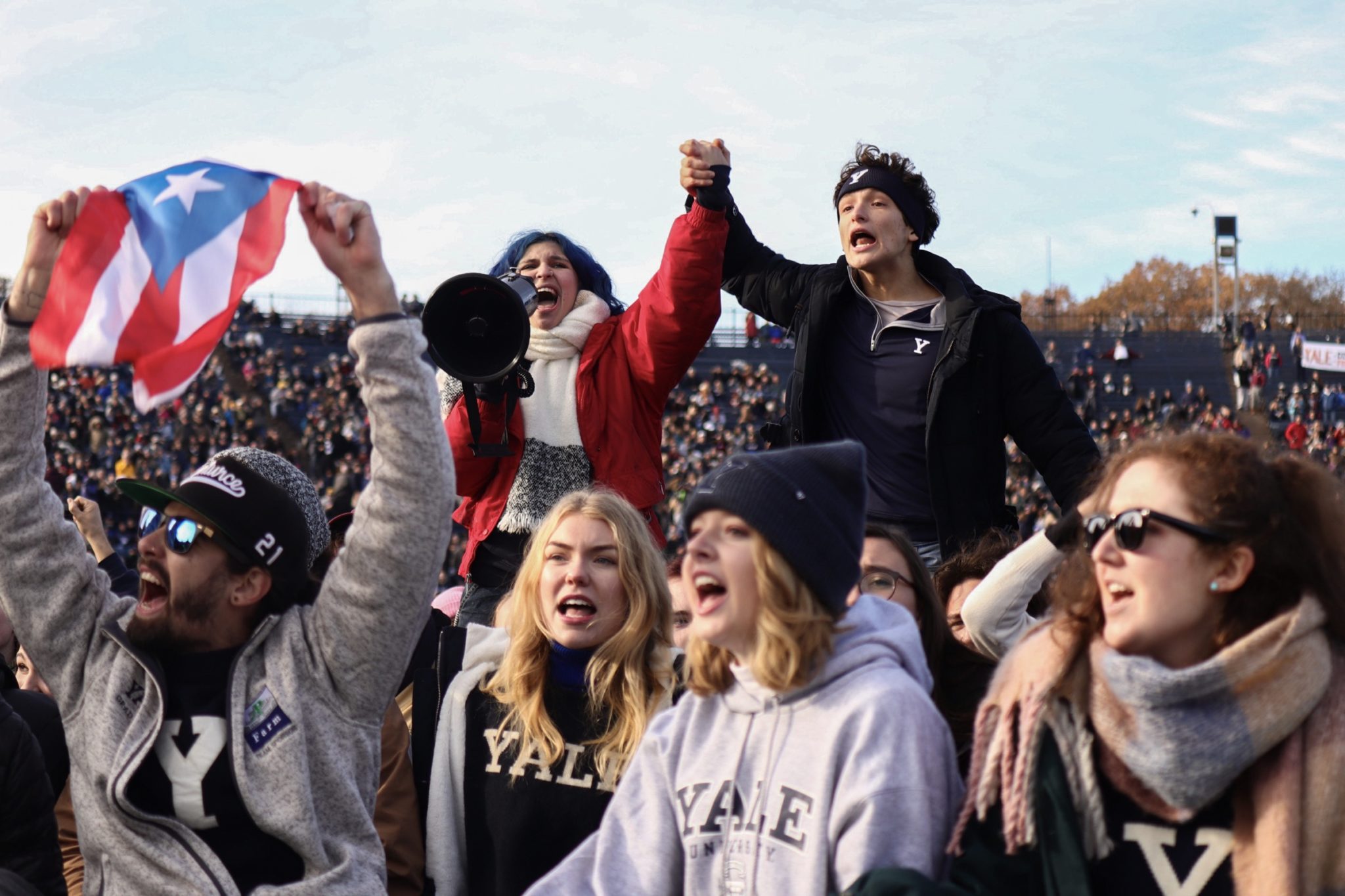
Marisa Peryer
Undergraduates weren’t the only ones to participate in the divestment protest at the Harvard-Yale game — Yale School of Nursing clinical instructor Victoria McEvoy stood shoulder to shoulder with the activists, and the rally has since accrued support from several faculty members across the University.
McEvoy was the only Yale educator among 50 protestors who were forcibly removed from the football field and charged with disorderly conduct. In an interview with the News, McEvoy said she has been a climate activist since the early 1970s when she witnessed her Appalachian town get “devastated” by strip miners looking for coal. The dire threat of climate change compelled her to disrupt the Nov. 23 game, McEvoy explained.
“Any educator can only teach by example and by encouraging students and others to investigate and discuss issues, to think for themselves and to act in meaningful and authentic ways,” McEvoy told the News.
McEvoy added that her “actions speak for themselves.” She said that when a person’s “home is burning” people must do what is necessary to save themselves, their families and their homes.
In a statement to the News, University spokesperson Karen Peart said Yale is committed to the free expression of ideas by members of the University community, including expression of political views. The University protects the freedom of students and faculty to engage in scholarship related to political life and discourse, Peart added.
Students who protested at the Game with McEvoy praised her activism and said adults’ involvement helps advance their demands to the University.
One student arrested at the game, Daniel Blokh ’23, said that when adults protest alongside students it shows the Yale administration that support for divestment extends beyond undergraduates.
“[McEvoy’s] involvement certainly helped to dispel my feeling that adults aren’t willing to stand up for these issues, and I hope it will serve as an example for other professors to see that they can also challenge Yale’s complicity,” Blokh said. “Teacher involvement in protests like this would add pressure on Yale to divest, and the more pressure, the closer we can come to our goal.”
Nora Heaphy ’21, who helped organize the protest, added that adults like McEvoy lent experience with activism to the movement.
Yale parent Melinda Tuhus told the News that she has previously been arrested two times during protests for climate justice — once at Yale and once in 2011 at the White House to prevent the development of the Keystone XL Pipeline.
Heaphy said adults’ participation in the protest forces the University to confront activists’ demands, instead of deferring accountability until student organizers graduate. The older generation’s participation demonstrated that divestment has “broad support from within every group in the Yale community,” Heaphy said. According to Heaphy, activists have pressured the University to divest from fossil fuels for the past seven years, to no avail.
“We chose to disrupt the game because we felt we had no other option,” she said.
Gregg Gonsalves ’11, an assistant professor of epidemiology at Yale who did not participate in the protest, praised the student activists’ nonviolent and attention-grabbing idea. In an email to the News, Gonsalves called the protest “strategically brilliant” for capitalizing on the media attention the game receives yearly.
The protest exposed a discrepancy in how the generations respond to climate change. Tuhus recognized the challenge for older people to have the foresight to comprehend and combat an issue that likely won’t affect them.
“As much as I try, I cannot make my brain conceive of what it will be like in 30 or 40 or 50 years when I don’t expect to be around,” Tuhus said.
“It looks like there’s a lot of common sense that has missed their generation … It goes to show that this generation is all about themselves and not a football game,” 68-year-old Chuck Crummie said in a Washington Post article about the protest. Crummie and his son, a former Yale football player, attended the game together.
In the protests’ wake, Tuhus noted many members of the older generation objected to the disruption of the game.
Gonsalves wrote that given the magnitude of climate change, the world cannot tolerate complacency from students or faculty members.
He said that the “one thing that doesn’t work [is] standing by and watching, doing nothing.”
In a Sept. 19 Yale News article, University President Peter Salovey said that Yale is “uniquely positioned to help the world understand and mitigate climate change.”
Rose Horowitch | rose.horowitch@yale.edu
Correction, Dec. 5: A previous version of this article incorrectly stated that McEvoy is a clinical instructor at the School of Medicine. In fact, McEvoy is a clinical instructor at the School of Nursing. She was formerly a clinical instructor at the School of Medicine. The article has been updated to accurately reflect this.







